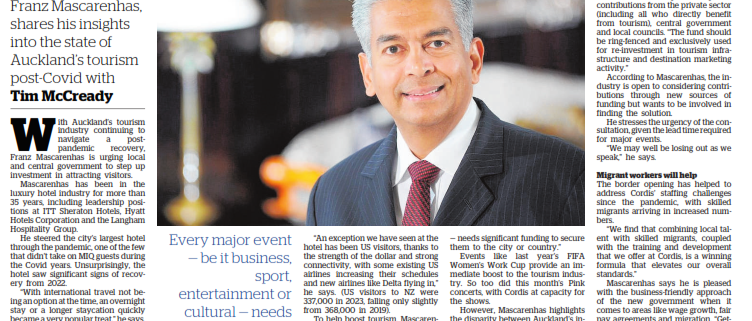Bold investment needed for success
With Auckland’s tourism industry continuing to navigate a post-pandemic recovery, Franz Mascarenhas is urging local and central government to step up investment in attracting visitors.
Mascarenhas has been in the luxury hotel industry for more than 35 years, including leadership positions at ITT Sheraton Hotels, Hyatt Hotels Corporation and the Langham Hospitality Group.
He steered the city’s largest hotel through the pandemic, one of the few that didn’t take on MIQ guests during the Covid years. Unsurprisingly, the hotel saw significant signs of recovery from 2022.
“With international travel not being an option at the time, an overnight stay or a longer staycation quickly became a very popular treat,” he says. “This growth in demand was obviously gratefully received for a business like ours, but it brought its own set of hurdles, primarily in recruiting enough staff to meet the increased demand.”
Since then, the industry has seen a decent recovery and has come through a strong summer period. Mascarenhas says Cordis has seen occupancy rates back close to the mid-70s over the summer months, although looking ahead to the winter season, numbers do not yet look as robust.
Mascarenhas says cost of living pressures seen worldwide along with increased prices of airline fares have undoubtedly contributed to lower inbound travel numbers.
Key markets like China (151,000 visitors in 2023 compared with 407,000 in 2019) and Australia (161,000 in 2023 compared with 196,000 in 2019) have seen a significant decline from pre-pandemic levels.
“An exception we have seen at the hotel has been US visitors, thanks to the strength of the dollar and strong connectivity, with some existing US airlines increasing their schedules and new airlines like Delta flying in,” he says. (There were were 337,000 US visitors to NZ in 2023, falling only slightly from 368,000 in 2019).
To help boost tourism, Mascarenhas wants local and central government to take the importance of the sector to Auckland and New Zealand seriously.
“We are a large contributor to the Government’s GST intake, a large employer, given we are a people-related business, a large foreign exchange earner, and the conduit to much more economic activity such as shopping, eating out and entertainment.”
He says there is not enough ability for the tourism industry to effectively market Auckland or New Zealand as a destination.
“Every major event — be it business, sport, entertainment or cultural — needs significant funding to secure them to the city or country.”
Events like last year’s Fifa Women’s World Cup provide an immediate boost to the tourism industry. So too did this month’s Pink concerts, with Cordis at capacity for the shows.
However, Mascarenhas highlights the disparity between Auckland’s investment and the returns major events can bring. While Auckland struggles to raise $15 million in a year for tourism attraction, other markets pay millions just to attract a single event. Singapore’s recent investment to lure Taylor Swift pales in comparison to the economic boon her Eras show delivered, with economists estimating it generated up to NZ$600m. Had the shows been hosted in New Zealand, they could have amounted to around $70m for the country.
“Bold investments have proven to have an incredible impact on the economy and a large return on investment,” he says.
He proposes a solution is needed that not only helps to attract tourism to Auckland, but all of New Zealand. This could involve a partnership with contributions from the private sector (including all who directly benefit from tourism), central government and local councils. “The fund should be ring-fenced and exclusively used for reinvestment in tourism infrastructure and destination marketing activity.”
According to Mascarenhas, the industry is open to considering contributions through new sources of funding but wants to be involved in finding the solution.
He stresses the urgency of the consultation, given the lead time required for major events.
“We may well be losing out as we speak,” he says.
Migrant workers will help
The border opening has helped to address Cordis’ staffing challenges since the pandemic, with skilled migrants arriving in increased numbers.
“We find that combining local talent with skilled migrants, coupled with the training and development that we offer at Cordis, is a winning formula that elevates our overall standards.”
Mascarenhas says he is pleased with the business-friendly approach of the new Government when it comes to areas like wage growth, fair-pay agreements and migration. “Getting these settings correct help businesses to succeed and ultimately have a natural positive flow on effect to the workforce.”
He would like to see continued efforts to market Auckland as a great place for hospitality workers to stay.
“With the cost of living impacting everyone, the size of Auckland is an advantage compared with smaller cities which struggle when it comes to the likes of housing and job opportunities.”
After 11 years, Mascarenhas will soon step down from running Cordis Auckland and move to an advisory role with the Langham Group.



